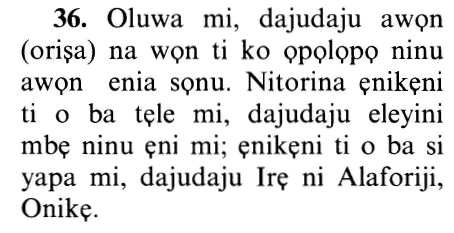14vs36
Select any filter and click on Go! to see results
رَبِّ إِنَّهُنَّ أَضْلَلْنَ كَثِيراً مِّنَ النَّاسِ فَمَن تَبِعَنِي فَإِنَّهُ مِنِّي وَمَنْ عَصَانِي فَإِنَّكَ غَفُورٌ رَّحِيمٌ
Rabbi innahunna adlalna katheeran mina alnnasi faman tabiAAanee fainnahu minnee waman AAasanee fainnaka ghafoorun raheemun
Index Terms
Click to play
Yoruba Translation

Hausa Translation
"Yã Ubangijina! Lalle ne sũ, sun ɓatar da mãsu yawa daga mutãne sa´an nan wanda ya bĩ ni, to, lalle shi, yanã daga gare ni, kuma wanda ya sãɓa mini, to, lalle ne Kai Mai gãfara ne, Mai jin ƙai.
Asbabu n-Nuzuul (Occasions of Revelation)
رَبِّ إِنَّهُنَّ أَضْلَلْنَ كَثِيرًا مِّنَ النَّاسِ فَمَن تَبِعَنِي فَإِنَّهُ مِنِّي وَمَنْ عَصَانِي فَإِنَّكَ غَفُورٌ رَّحِيمٌ ﴿٣٦﴾
"O my Lord! They have indeed led astray many among mankind. But whoso follows me, he verily, is of me. And whoso disobeys me, still You are indeed Oft-Forgiving, Most Merciful.
Ibrahim next mentioned that many among mankind were led astray because of idols, and he disowned those who worship them and referred their matter to Allah; if Allah wills, He will punish them, and if He wills, He will forgive them.
Isa, peace be upon him, said similar words,
إِن تُعَذِّبْهُمْ فَإِنَّهُمْ عِبَادُكَ وَإِن تَغْفِرْ لَهُمْ فَإِنَّكَ أَنتَ الْعَزِيزُ الْحَكِيمُ
If You punish them, they are Your servants, and if You forgive them, verily, You, only You are the Almighty, the All-Wise. (5:118)
This supplication refers this and all matters to Allah, not that it is actually going to happen.
Abdullah bin Amr narrated that the Messenger of Allah recited Ibrahim's supplication,
رَبِّ إِنَّهُنَّ أَضْلَلْنَ كَثِيرًا مِّنَ النَّاسِ ...
O my Lord! They have indeed led astray many among mankind.,
and the supplication of Isa,
إِن تُعَذِّبْهُمْ فَإِنَّهُمْ عِبَادُكَ
If You punish them, they are Your servants. (5:118)
then raised his hands and said,
اللَّهُمَّ أُمَّتِي،
اللَّهُمَّ أُمَّتِي،
اللَّهُمَّ أُمَّتِي
O Allah, Save my Ummah!
O, Allah, Save my Ummah!
O, Allah, Save my Ummah!
and cried.
Allah said to the angel Jibril, "O Jibril, go to Muhammad, and Your Lord has more knowledge, and ask him what makes him cry.''
Jibril came to the Prophet and asked him, and he repeated to him what he said (in his supplication).
Allah said, "Go to Muhammad and tell him this;
`We will make you pleased with your Ummah, O Muhammad, and will not treat them in a way you dislike.'''
قال عبد الله بن وهب حدثنا عمرو بن الحارث أن بكر بن سوادة حدثه عن عبد الرحمن بن جرير عن عبد الله بن عمرو أن رسول الله صلى الله عليه وسلم تلا قول إبراهيم عليه السلام " رب إنهن أضللن كثيرا من الناس " الآية وقول عيسى عليه السلام" إن تعذبهم فإنهم عبادك " الآية ثم رفع يديه ثم قال " اللهم أمتي اللهم أمتي اللهم أمتي" وبكى فقال الله اذهب يا جبريل إلى محمد وربك أعلم وسله ما يبكيك ؟ فأتاه جبريل عليه السلام فسأله فأخبره رسول الله صلى الله عليه وسلم ما قال : فقال الله اذهب إلى محمد فقل له إنا سنرضيك في أمتك ولا نسوءك .
"رب إنهن" أي الأصنام "أضللن كثيرا من الناس" بعبادتهم لها "فمن تبعني" على التوحيد "فإنه مني" من أهل ديني "ومن عصاني فإنك غفور رحيم" هذا قبل علمه أنه تعالى لا يغفر الشرك
لما كانت سببا للإضلال أضاف الفعل إليهن مجازا ; فإن الأصنام جمادات لا تفعل .
I'raab - grammatical analysis of the Qur'an
«رَبِّ» منادى بأداة نداء محذوفة منصوب بالفتحة المقدرة على ما قبل ياء المتكلم والياء محذوفة للتخفيف في محل جر مضاف إليه.
«إِنَّهُنَّ» إن واسمها والجملة مقول القول.
«أَضْلَلْنَ» ماض مبني على السكون لاتصاله بنون النسوة والنون فاعل.
«كَثِيراً» مفعول به والجملة خبر إن.
«مِنَ النَّاسِ» متعلقان بأضللن.
«فَمَنْ» الفاء استئنافية ومن اسم شرط جازم مبتدأ.
«تَبِعَنِي» ماض والنون للوقاية والياء مفعول به والجملة مع جملة الجواب خبر المبتدأ.
«فَإِنَّهُ» الفاء رابطة للجواب وإن واسمها والجملة في محل جزم جواب الشرط و«مِنِّي» متعلقان بالخبر المحذوف.
«وَمَنْ عَصانِي» معطوف على من تبعني.
«فَإِنَّكَ غَفُورٌ رَحِيمٌ» إن واسمها وخبراها والجملة معطوفة.
